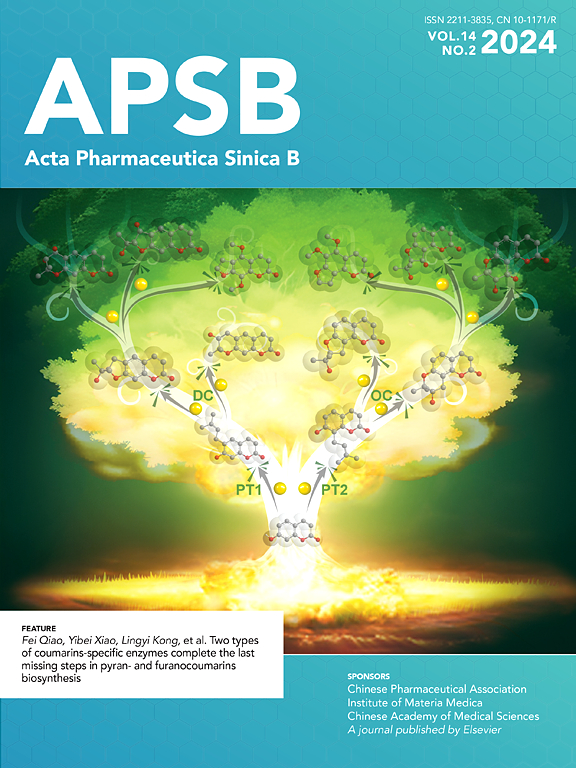纳米药物驱动的肿瘤糖代谢重编程增强癌症免疫治疗
IF 14.6
1区 医学
Q1 PHARMACOLOGY & PHARMACY
引用次数: 0
摘要
肿瘤表现为糖代谢异常,消耗过多的葡萄糖并分泌乳酸,从而构建肿瘤微环境,促进肿瘤进展,破坏免疫治疗效果。目前,肿瘤糖代谢失调重塑免疫抑制微环境,提高免疫治疗效果正成为一种创新的治疗策略。然而,糖代谢调节剂缺乏特异性,在克服肿瘤传递障碍、微环境复杂性和代谢异质性方面仍面临重大挑战,导致临床效益不佳。纳米药物具有选择性靶向肿瘤或免疫细胞、对肿瘤微环境作出反应、联合递送多种药物和促进组合治疗的能力,在通过肿瘤糖代谢重编程增强免疫治疗方面具有重要的前景。这篇综述探讨了肿瘤葡萄糖代谢-特别是代谢物运输,糖酵解过程和乳酸-与免疫微环境之间的复杂相互作用。我们总结了纳米药物介导的肿瘤糖代谢重编程如何提高免疫治疗效果,并概述了该领域的前景和挑战。本文章由计算机程序翻译,如有差异,请以英文原文为准。

Nanomedicine-driven tumor glucose metabolic reprogramming for enhanced cancer immunotherapy
Tumors exhibit abnormal glucose metabolism, consuming excessive glucose and excreting lactate, which constructs a tumor microenvironment that facilitates cancer progression and disrupts immunotherapeutic efficacy. Currently, tumor glucose metabolic dysregulation to reshape the immunosuppressive microenvironment and enhance immunotherapy efficacy is emerging as an innovative therapeutic strategy. However, glucose metabolism modulators lack specificity and still face significant challenges in overcoming tumor delivery barriers, microenvironmental complexity, and metabolic heterogeneity, resulting in poor clinical benefit. Nanomedicines, with their ability to selectively target tumors or immune cells, respond to the tumor microenvironment, co-deliver multiple drugs, and facilitate combinatorial therapies, hold significant promise for enhancing immunotherapy through tumor glucose metabolic reprogramming. This review explores the complex interactions between tumor glucose metabolism-specifically metabolite transport, glycolysis processes, and lactate-and the immune microenvironment. We summarize how nanomedicine-mediated reprogramming of tumor glucose metabolism can enhance immunotherapy efficacy and outline the prospects and challenges in this field.
求助全文
通过发布文献求助,成功后即可免费获取论文全文。
去求助
来源期刊

Acta Pharmaceutica Sinica. B
Pharmacology, Toxicology and Pharmaceutics-General Pharmacology, Toxicology and Pharmaceutics
CiteScore
22.40
自引率
5.50%
发文量
1051
审稿时长
19 weeks
期刊介绍:
The Journal of the Institute of Materia Medica, Chinese Academy of Medical Sciences, and the Chinese Pharmaceutical Association oversees the peer review process for Acta Pharmaceutica Sinica. B (APSB).
Published monthly in English, APSB is dedicated to disseminating significant original research articles, rapid communications, and high-quality reviews that highlight recent advances across various pharmaceutical sciences domains. These encompass pharmacology, pharmaceutics, medicinal chemistry, natural products, pharmacognosy, pharmaceutical analysis, and pharmacokinetics.
A part of the Acta Pharmaceutica Sinica series, established in 1953 and indexed in prominent databases like Chemical Abstracts, Index Medicus, SciFinder Scholar, Biological Abstracts, International Pharmaceutical Abstracts, Cambridge Scientific Abstracts, and Current Bibliography on Science and Technology, APSB is sponsored by the Institute of Materia Medica, Chinese Academy of Medical Sciences, and the Chinese Pharmaceutical Association. Its production and hosting are facilitated by Elsevier B.V. This collaborative effort ensures APSB's commitment to delivering valuable contributions to the pharmaceutical sciences community.
 求助内容:
求助内容: 应助结果提醒方式:
应助结果提醒方式:


